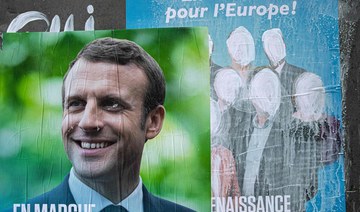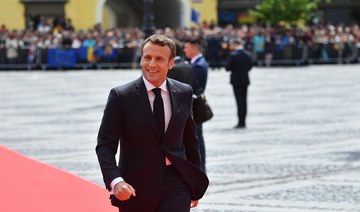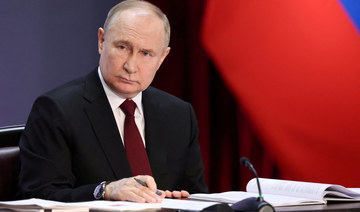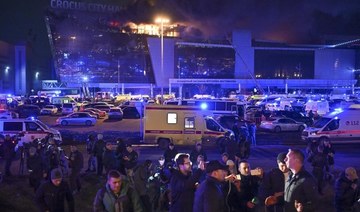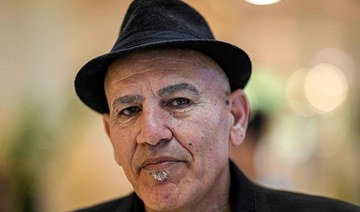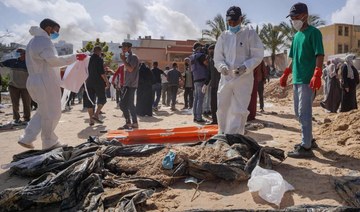PARIS: The last time French President Emmanuel Macron hosted Donald Trump in France, it turned into a diplomatic fiasco which underlined how once warm relations between the men had chilled to the point of freezing.
As the two men prepare to hold talks on Thursday on the sidelines of D-Day commemorations, Macron and French diplomats are hoping for a smoother run.
Trump’s trip in November last year for the 100-year anniversary of the end of World War I culminated in a hail of bad-tempered tweeting caused by the US president’s bruised ego, a French diplomat told AFP.
During a ceremony at the Arc de Triomphe, with Trump seated among 70 leaders in the French capital, Macron delivered a speech that included an open rebuke of his brand of “America First” nationalism.
“Nationalism is a betrayal of patriotism,” the 41-year-old centrist French leader said in a 20-minute address that also criticized “saying our interests come first and others don’t matter.”
The diplomat, speaking on condition of anonymity, said that the US real estate mogul had been angered by those lines and was also frustrated when a planned trip to an American military cemetery by helicopter was canceled due to bad weather.
“There was also the sense that he came and he was one among other leaders and not THE leader who would make the big speech,” the diplomat explained. “It was a difficult period to manage.”
Two days after leaving the French capital, Trump let his fury known, mocking Macron for his “very low approval ratings” and writing how the French “were starting to learn German in Paris before the US came along” in World War II.
The US role in liberating France will be commemorated on Thursday by Trump and Macron on the 75th anniversary of the D-Day landings when 150,000 Allied troops began an invasion of Nazi-ruled France.
The two leaders will meet at the Colleville-sur-Mer American cemetery in northern France and then sit down for a working lunch in the town of Caen.
Their wives Melania and Brigitte, who have reportedly struck up a warm relationship, are to lunch together separately.
The French diplomat said that after the open hostilities in November, Macron and Trump had held several phone calls during which they rebuilt a relationship that had started surprisingly well after Macron’s election in 2017.
The US president was made a guest of honor of France’s National Day in July of that year and the two men referred to each other as “friends” and repeatedly patted each other on the back. The visit ended with a 25-second-long handshake.
“The relationship is still warm and direct,” the diplomat said. “Our approach has stayed the same: we continue to try to persuade and at the same time to cushion the impact when we haven’t succeeded.”
The problem for Macron is that his successes in persuading Trump and changing his thinking are few and far between, while the policy disagreements and gap between their visions of the world are becoming ever more glaring.
“Macron is not shy about saying the problem in the world is the populist nationalist movement,” Trump’s one-time adviser and campaign manager Steve Bannon told AFP in a recent interview.
“Macron is always looking to take a shot at the nationalists and I think sometimes he’s done it in inappropriate situations,” he added, saying that Trump in his view had been “very magnanimous” given the criticism.
He also recalled Macron’s speech to the US Congress in Washington in April last year, which he said included “several nasty lines” about the dangers of nationalism and isolationism.
The French leader, sometimes described as an “anti-Trump” on the world stage, has been a vocal critic of unilateral US decisions to pull out of the 2015 deal governing Iran’s nuclear program and the Paris climate accord.
On Monday, he again condemned Trump’s trade policies, which have led to tariffs on European steel and aluminum imports and a growing trade war with China.
“With the US, we have discussions because they decide to put tariffs with unreasonable scenarios and argumentation,” Macron told global bankers in Paris in comments delivered in English.
Macron also knows that being critical of the American president plays well domestically in France where Trump is widely unpopular.
A poll by the YouGov survey group released on Wednesday showed that only 17 percent of French people had a positive view of the former reality TV star.
And only 24 percent thought Macron should take a more cooperative approach with him.
“With every American administration, there are things we disagree on, different interests, but we express ourselves clearly,” a second French diplomatic source said.
A sign of how far the Trump-Macron relationship has turned comes from the front garden of the White House.
When Macron visited for a state visit in April 2018, still hoping to persuade Trump to respect the Iran nuclear deal and drop tariffs on European steel imports, the two leaders planted an oak tree together.
The sapling, taken from a battlefield in France where US soldiers had fought in World War I, has since withered and died, Le Monde newspaper reported Wednesday.
Macron and Trump: ‘frenemies’ in open disagreement
Macron and Trump: ‘frenemies’ in open disagreement
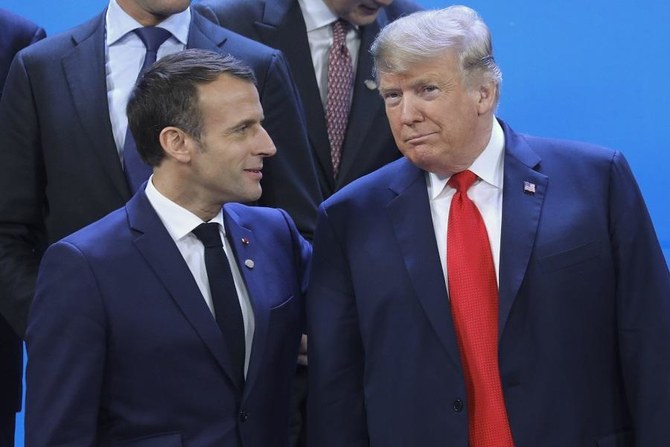
- The two leaders will meet at the Colleville-sur-Mer American cemetery in northern France and then sit down for a working lunch in the town of Caen
- Macron and Trump had held several phone calls during which they rebuilt a relationship that had started surprisingly well after Macron’s election in 2017
Ukraine suspends consular services abroad for men of fighting age

- Ukraine’s foreign affairs ministry “announced a temporary suspension of accepting new applications for consular services” for men between 18 and 60
- It made an exception for documents allowing Ukrainians to return to Ukraine
KYIV: Ukraine authorities on Tuesday suspended consular services for men of fighting age living abroad, after announcing measures to bring them home amid manpower shortages in the army fighting Russia.
Ukraine’s army has been struggling to hold frontlines, partly due to a lack of soldiers over two years into Russia’s invasion.
Ukraine’s foreign affairs ministry “announced a temporary suspension of accepting new applications for consular services” for men between 18 and 60.
It made an exception for documents allowing Ukrainians to return to Ukraine.
The move would likely oblige Ukrainian men to return from abroad to undergo administrative procedures that were previously available abroad.
The government has already adopted a mobilization law, due to come into force on May 18, that toughens penalties against draft dodgers and obliges men to keep their military registration up-to-date.
The ministry said men would be able to access consular services once the law came into force and “after updating their military registration.”
“Male citizen of Ukraine aged 18 to 60 with valid military registration documents will have full access to consular services,” the ministry said.
Ukrainian men have been forbidden to leave the country since the invasion began, apart from a few exceptions.
But some lived away before the war began, and Ukrainian media estimates that thousands more illegally fled the country.
Major arrests at NYU campus as Gaza protests spread
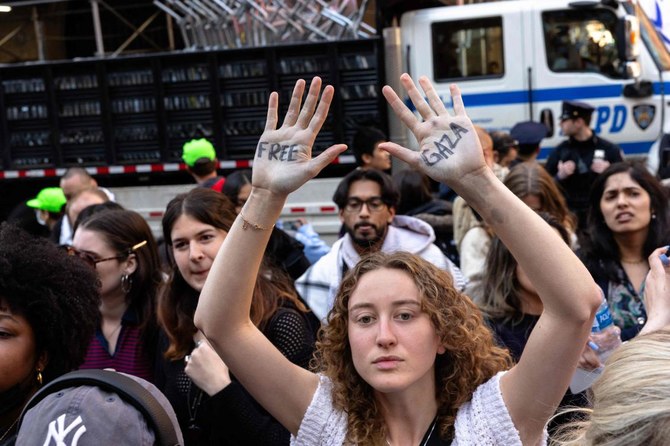
- Some of America’s most prestigious universities have been rocked by protests in recent weeks
- On Tuesday, the New York Police Department said 133 people had been arrested at NYU and released after being issued with court summons
NEW YORK: More than 130 people were arrested overnight during pro-Palestinian protests at the New York University campus, as student demonstrations gather pace in the United States over the Israel-Hamas war.
Some of America’s most prestigious universities have been rocked by protests in recent weeks as students and other agitators take over quads and disrupt campus activities.
The demonstrations come amid sweeping debates over Israel’s assault on Gaza, following Hamas’s deadly invasion on October 7.
Such bastions of higher education — Harvard, Yale, Columbia and others — are grappling for a balance between students demanding free speech rights and others who argue that campuses are encouraging intimidation and hate speech.
On Tuesday, the New York Police Department told AFP that 133 people had been arrested at NYU and released after being issued with court summons, as protests also intensify at Yale, Columbia University and other campuses.
As the holiday of Passover began Monday night, police began detaining demonstrators at an encampment at NYU who had earlier refused orders to disperse.
A New York University spokesman said the decision to call police came after additional protesters, many of whom were not thought to be affiliated with NYU, suddenly breached the barriers erected around the encampment.
This “dramatically changed” the situation, the spokesman said in a statement on the school’s website Monday, citing “disorderly, disruptive and antagonizing behavior” along with “intimidated chants and several antisemitic incidents.”
“Given the foregoing and the safety issues raised by the breach, we asked for assistance from the NYPD. The police urged those on the plaza to leave peacefully, but ultimately made a number of arrests.”
The spokesman said the school continues to support freedom of expression and the safety of students.
But protests have grown large and disruptive enough — New York Police Department spokesmen have spoken of their officers facing violence when confronting protesters at NYU — to draw the attention of President Joe Biden and his administration.
“Anti-Semitic hate on college campuses is unacceptable,” US Secretary of Education Miguel Cardona posted on X on Tuesday, expressing concern about the unrest.
The protests began last week at Columbia University, also in New York, with a large group of demonstrators establishing a so-called “Gaza Solidarity Encampment” on school grounds.
But more than 100 protesters were arrested after university authorities called the police onto Columbia’s campus Thursday, a move that seemingly escalated tensions and sparked a greater turnout over the weekend.
Social media images late Monday appeared to show pro-Palestinian Jewish students holding traditional seder meals inside the protest areas on campuses including at Columbia.
There were also demonstrations at MIT, the University of Michigan, UC Berkeley and Yale, where at least 47 people were arrested Monday after refusing requests to disperse.
France arrests eight in PKK financing probe
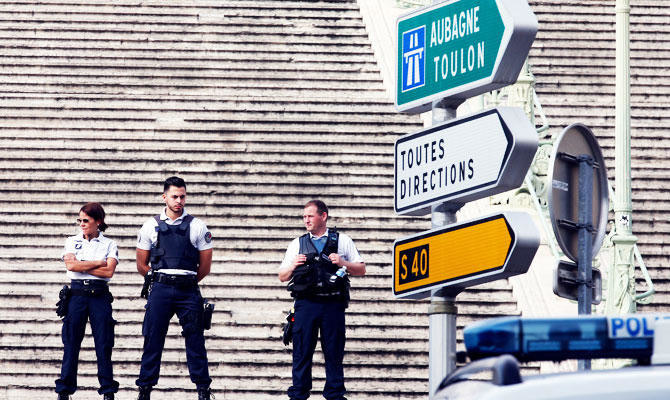
- The arrests took place in the Paris region and in southern France, the PNAT anti-terror unit said
- French prosecutors suspect the eight of preparing and financing terrorist acts
PARIS: French police arrested eight men on Tuesday as part of an investigation into the finances of the Kurdistan Workers Party (PKK), banned as a terror organization by Turkiye and its Western allies, anti-terrorism prosecutors told AFP.
The arrests took place in the Paris region and in southern France, the PNAT anti-terror unit said.
The PKK has been designated a terrorist organization by Turkiye, the United States and the European Union.
French prosecutors suspect the eight of preparing and financing terrorist acts, and of conspiring to extort, or attempt to extort, funds to finance a terrorist organistion between 2020 and 2024, the PNAT said.
Investigators believe the eight to be connected to a campaign to collect funds from Kurdish business people and other Kurds in France, a source close to the case added.
Police can hold the suspects for up to 96 hours for questioning, the source said.
Another source said the funds were destined for use in Belgium, where police on Monday raided Kurdish-run media as part of a probe undertaken at the request of a French anti-terror judge, the PNAT said.
The PKK has waged a decades-long insurgency for greater autonomy for the Kurdish minority of Turkiye in the southeast of the country, in a standoff with the Ankara government that remains unresolved to this day.
Dutch intelligence sees the wars in Gaza and Ukraine as triggers for terrorist threats
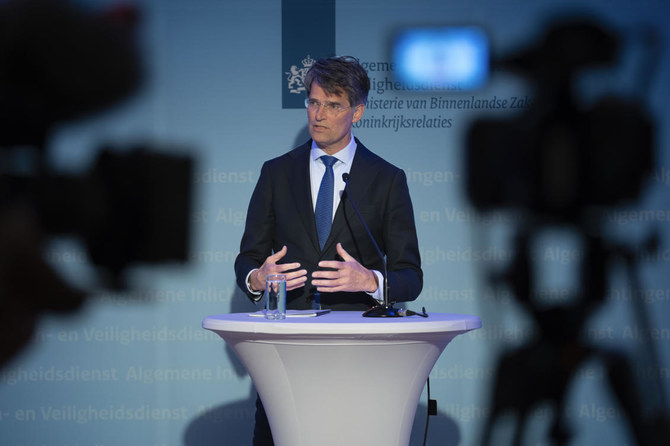
- The Israel-Hamas war in Gaza and the destruction of a Qur’an outside parliament last year are “trigger events” for extremists
- “The terrorist threat is serious at this moment,” the agency’s director-general, Erik Akerboom, told AP
ZOETERMEER, Netherlands: The Dutch national intelligence agency said Tuesday that threats targeting the Netherlands are increasingly connected to worldwide turmoil, including the wars in Gaza and Ukraine.
Although the number of terror attacks across Europe has been down in recent years, the General Intelligence and Security Service in its annual report said the Israel-Hamas war in Gaza and the destruction of a Qur’an outside parliament last year are “trigger events” for extremists.
“The terrorist threat is serious at this moment,” the agency’s director-general, Erik Akerboom, told The Associated Press.
Akerboom said he is particularly concerned about big events, noting that the agency is working closely with French authorities to prevent incidents during the Paris Olympics this summer.
In December, the Dutch counterterrorism agency increased the country’s threat alert to its second-highest level because of concerns about the Daesh group’s Khorasan affiliates, Akerboom said. IS-K, a Central Asian affiliate, was responsible for the attack at a suburban Moscow concert hall that killed at least 133 people in March.
According to the new report, “global jihadism has been the greatest terrorist threat for years in the Netherlands.” Incidents such as the one last April, when an anti-Islam activist tore pages from the Qur’an in front of the Dutch parliament building, put the Netherlands on the map of targets.
About a dozen terror attacks were thwarted by authorities in Europe last year and in four cases, suspects were arrested in the Netherlands, the report said. None of those attacks was focused on the Netherlands, according to Akerboom.
The Dutch also see threats from China, in particular cyberattacks, as a major concern. Akerboom said China is producing more hackers to break into Dutch systems than the Dutch can produce to defend them. The security service has cited China as the biggest threat to the country’s economic security.
Russia also continues to pose a risk to the Netherlands amid Moscow’s full-scale invasion of Ukraine. So-called peace protests in Amsterdam which call for the Dutch to stop sending arms to Ukraine have included demonstrators paid by Russian sources to attend and given prefabricated slogans, the security service has asserted.
The Netherlands is of particular interest to Moscow in part because of the international institutions housed here, including the International Criminal Court. The Hague-based court is investigating crimes in Ukraine and has issued arrest warrants for President Vladimir Putin and other Russians.
Sunak says UK to raise defense spending amid global threats
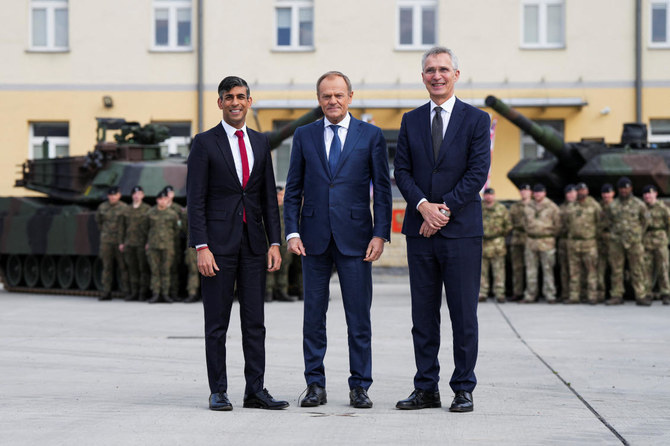
- “In a world that is the most dangerous it has been since the end of the Cold War, we cannot be complacent,” Sunak told reporters
- The increase in spending from 2.3 percent will see the UK become one of the highest spenders on defense in the 32-member defense alliance
WARSAW: Britain will raise defense spending to 2.5 percent of GDP by 2030 in a “most dangerous” world, Prime Minister Rishi Sunak said Tuesday during a visit to Poland.
The commitment came as NATO countries face pressure to raise defense spending in the face of global threats, particularly from Russia.
“In a world that is the most dangerous it has been since the end of the Cold War, we cannot be complacent,” Sunak told reporters in Warsaw, where he held a press conference with NATO Secretary-General Jens Stoltenberg.
The increase in spending from 2.3 percent will see the UK become one of the highest spenders on defense in the 32-member defense alliance after the United States, the British government said.
It means the UK is expected to spend £87 billion on defense in 2030-31, an increase of £23 billion over current levels.
“I believe we must do more to defend our country, our interests, and our values,” Sunak said, announcing “the biggest strengthening of national defense for a generation.”
Western nations are under pressure to boost defense funding following Moscow’s invasion of its neighbor Ukraine as well as the threat of escalation in the Middle East.
EU chief Ursula von der Leyen recently called for a “European awakening on defense and security.”
Brussels is set to come up with more proposals for financing the defense push by a summit of EU leaders in June.
Sunak has also faced calls from his Conservative Party to boost defense spending, with some calling for a level of three percent of GDP.
On Tuesday, Sunak also announced £500 million additional funding for Ukraine’s war effort against Russia.



